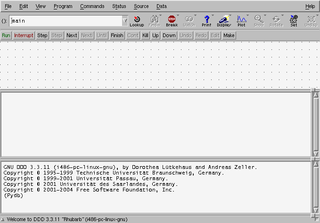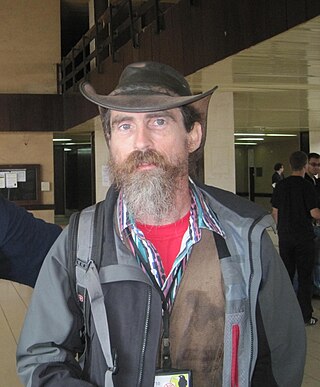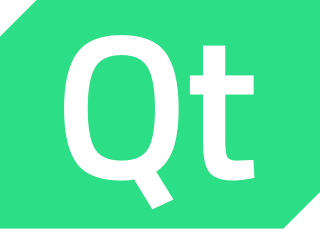
The GNU Debugger (GDB) is a portable debugger that runs on many Unix-like systems and works for many programming languages, including Ada, Assembly, C, C++, D, Fortran, Haskell, Go, Objective-C, OpenCL C, Modula-2, Pascal, Rust, and partially others.
An integrated development environment (IDE) is a software application that provides comprehensive facilities for software development. An IDE normally consists of at least a source-code editor, build automation tools, and a debugger. Some IDEs, such as IntelliJ IDEA, Eclipse and Lazarus contain the necessary compiler, interpreter or both; others, such as SharpDevelop and NetBeans, do not.

A debugger or debugging tool is a computer program used to test and debug other programs. The main use of a debugger is to run the target program under controlled conditions that permit the programmer to track its execution and monitor changes in computer resources that may indicate malfunctioning code. Typical debugging facilities include the ability to run or halt the target program at specific points, display the contents of memory, CPU registers or storage devices, and modify memory or register contents in order to enter selected test data that might be a cause of faulty program execution.

Data Display Debugger is a graphical user interface for command-line debuggers such as GDB, DBX, JDB, HP Wildebeest Debugger, XDB, the Perl debugger, the Bash debugger, the Python debugger, and the GNU Make debugger. DDD is part of the GNU Project and distributed as free software under the GNU General Public License.
The Binary File Descriptor library (BFD) is the GNU Project's main mechanism for the portable manipulation of object files in a variety of formats. As of 2003, it supports approximately 50 file formats for some 25 instruction set architectures.
The GNU toolchain is a broad collection of programming tools produced by the GNU Project. These tools form a toolchain used for developing software applications and operating systems.
KGDB is a debugger for the Linux kernel and the kernels of NetBSD and FreeBSD. It requires two machines that are connected via a serial connection. The serial connection may either be an RS-232 interface using a null modem cable, or via the UDP/IP networking protocol. The target machine runs the patched kernel and the other (host) machine runs gdb. The GDB remote protocol is used between the two machines.

The GNU Binary Utilities, or binutils, are a set of programming tools for creating and managing binary programs, object files, libraries, profile data, and assembly source code.

Rob Savoye is the primary developer of Gnash. He is a developer for the GNU Project, having worked on Debian, Red Hat and dozens of other free/open source software projects. He was among the first employees of Cygnus Support, which was sold to Red Hat in 2001.
The tsort program is a command line utility on Unix and Unix-like platforms, that performs a topological sort on its input. As of 2017, it is part of the POSIX.1 standard.
LatticeMico32 is a 32-bit microprocessor reduced instruction set computer (RISC) soft core from Lattice Semiconductor optimized for field-programmable gate arrays (FPGAs). It uses a Harvard architecture, which means the instruction and data buses are separate. Bus arbitration logic can be used to combine the two buses, if desired.
A kernel debugger is a debugger present in some operating system kernels to ease debugging and kernel development by the kernel developers. A kernel debugger might be a stub implementing low-level operations, with a full-blown debugger such as GNU Debugger (gdb), running on another machine, sending commands to the stub over a serial line or a network connection, or it might provide a command line that can be used directly on the machine being debugged.

Nemiver is computer software, a graphical standalone debugger for the programming languages C and C++, which integrates in the GNOME desktop environment. It currently features a backend which uses the well known GNU Debugger (GDB). The creator and the current lead developer is Dodji Seketeli.

CodeLite is a free and open-source IDE for the C, C++, PHP, and JavaScript (Node.js) programming languages.

Qt Creator is a cross-platform C++, JavaScript, Python and QML integrated development environment (IDE) which simplifies GUI application development. It is part of the SDK for the Qt GUI application development framework and uses the Qt API, which encapsulates host OS GUI function calls. It includes a visual debugger and an integrated WYSIWYG GUI layout and forms designer. The editor has features such as syntax highlighting and autocompletion. Qt Creator uses the C++ compiler from the GNU Compiler Collection on Linux. On Windows it can use MinGW or MSVC with the default install and can also use Microsoft Console Debugger when compiled from source code. Clang is also supported.
gdbserver is a computer program that makes it possible to remotely debug other programs. Running on the same system as the program to be debugged, it allows the GNU Debugger to connect from another system; that is, only the executable to be debugged needs to be resident on the target system ("target"), while the source code and a copy of the binary file to be debugged reside on the developer's local computer ("host"). The connection can be either TCP or a serial line.
Record and replay debugging is the process of recording the execution of a software program so that it may be played back within a debugger to help diagnose and resolve defects. The concept is analogous to the use of a flight data recorder to diagnose the cause of an airplane flight malfunction.






